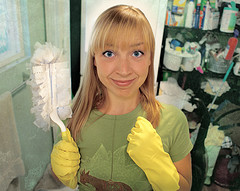We’ve Come So Far . . .
by Kerry Dirk
This piece is a brief rant about the current gender stereotypes that play out in commercials and other forms of advertisements. While sarcasm constantly reigns in this rant, there is also a grain of truth to these complaints. Yet there is also an amount of truth in these commercials, as they are not unintentionally addressing these stereotypical audiences.
I was inspired to write this piece after seeing endless commercials trying to sell me, a woman, various cleaning and cooking products. I was especially bothered because these commercials, by appealing to women, are really confirming that women are still the primary cookers and cleaners of households despite women’s prevalence in the workforce; advertisements know their target buyers. Perhaps my anger toward these commercials is indirect in that advertisers still have reason to advertise these products to women because the division of labor is still steeped in inequality.
As I sat grading student papers, the television droning quietly in the background, I heard something that pulled my attention to the screen. A woman, apparently portraying the role of a boss, sat behind a desk firmly telling an unseen person, “I’m sorry; I’m going to have to let you go.”
That’s odd, I thought; women are not normally portrayed in such positions of power in commercials. Then I saw whom, or rather what, the woman was talking to: a duster. Apparently, women have yet to gain power over anything other than cleaning products. Congratulations to all women, I thought; we have finally won the battle over dust. Perhaps tomorrow someone will invent a new toilet brush, and we can use our position in the hierarchy to fire the old one. Ah, nothing compares to the power one feels over one’s cleaning products.
This commercial is just one of several that depict a woman as an authoritative figure, while behind the façade she just wants more efficient cleaning products. Whether it be dirty laundry, a messy teenager’s room, or an unpleasant odor, no spill, stain, smell, or dirt is too tough for today’s modern women. Had I known this entire time that the key to success as a woman was not taking any bull from my mop, I would now have shinier floors and more free time to do things like laundry—with the newest, most pleasant smelling detergent that will keep my colors bright, of course.
Don’t get me wrong; I clean, but so do men. So why are women firing dust mops, brooms, and various other cleaning products, while men get to mow the lawn, take out the trash, or work on their cars? No commercial showing a man telling his barbeque to “take a hike” would ever air. Men get to fire real people. The commercials, though, would have us believe that all men love grilling, so men probably wouldn’t want to fire their grills anyway.
However, it is possible that we are headed toward equality after all, as commercials show us that women can now take part in traditionally male-dominated arenas like football—but only if we can do it from the kitchen. Take, for instance, a recent Super Bowl commercial for Wal-Mart. We see women taping their fingers, donning their oven mitts, and tying their aprons as the music swells. The women run between lines of men who give them high-fives. But these women are not playing football. Rather, these women, after being shown grocery shopping, are now preparing to cook for the big day, and the men cheer as women complete the necessary preparations. No number of hungry men is too many for these women. Apparently, the makers of this commercial believe that for men, it’s a day of football, but for women, a day of cooking. Touchdown, women. But wait; I think we just scored for the wrong team. Or we could just be playing the wrong game.
We may ask ourselves why so little progress has been made in the way of advertisements; however, it may not be the makers of these commercials who are at fault for choosing to sell products in this manner. After all, what sharp advertiser would not try to sell to its primary consumer? It is perhaps not these commercials that are to blame but rather the society whose preferences they reflect: Study after study shows that women still do a majority of the housework and cooking even when they have full-time jobs. Maybe the important question that needs to be asked is not whether these commercials are offensive but rather why, if so much progress has been made toward gender equality, do these heavily stereotypical commercials still exist?
Recently over the holiday season, my friend noticed a grocery store display of cooking products, announcing “Stocking Stuffers for Her.” This shopper being a woman who knows that many men also cook decided to make a complaint. As she told an associate that the display offended her, the associate could not help but express what she believed to be agreement: “I know exactly what you mean. After all, gay men like to cook, too.” My friend did not know whether to laugh or cry.
I would laugh, but I’m busy: I have to fire my frying pan.
Kerry Dirk recently completed her first year of doctoral work in Rhetoric and Composition at Ohio University. Her research interests include visual rhetoric, computers and composition, and composition pedagogy. She has published short works in Teaching English in the Two-Year College (TETYC) and is currently working on a study examining the meanings of participation in the freshman composition classroom. She finds that most of her inspiration occurs during her frequent runs, but her thoughts, while bordering on brilliance, often disappear before she can write them on paper.
This work has some rights reserved under a Creative Commons Attribution-Noncommercial-Share Alike 3.0 License.


